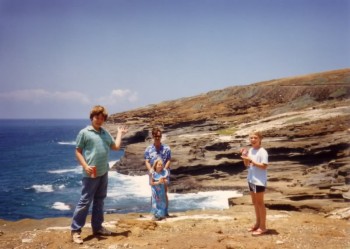When I was a small child, I trusted adults and authority figures greatly. I think most small children do. I was usually teacher’s pet; I vividly remember this being true in my second kindergarten (we moved part of the way through) and in third grade. I helped them with things without giving any thought to why or whether those things were important – like randomly checking to see if desks were kept neat and tidy. Today, I reckon it doesn’t matter if someone’s desk is tidy or not; everyone has their own system.
So what changed my attitude? Mrs. Curly, in fourth grade. I lived in Hawaii for kindergarten through third grade (ages 6-9), complete with lessons in the Hawaiian language. (I can just about remember how to count to four in Hawaiian.) Then we moved 4,500 miles to Michigan for my fourth grade year. We arrived in time for the worst blizzard they’d had in 30 years; that was fun. Mrs. Curly, who had very curly hair, was my teacher. We got to the part in the textbook where it told us about the Hawaiian island of Kauai. We must’ve been reading aloud, I suppose. The text book told us to pronounce it “kow-eee”, which is completely wrong. In Michigan, Hawaii is a faraway, almost mythical land, so they’d never know the error, except here they had someone on hand who did know better. I raised my hand and told Mrs. Curly that no, the book has it wrong, it’s actually “ka-why-ee” (with a very brief pause between the second and third syllable, which is why modern spellings put an apostrophe in the word that wasn’t in my textbook). She decided that no, we’d use the book’s pronunciation. Little did she know what a watershed that moment would be in my life.
In that instant, I learned that authority figures can be wrong. I learned that you should never believe anything just because “the teacher says so” or “the book says so.” I’ve carried that with me my whole life. I’ve questioned, I’ve wondered, I’ve pondered, I’ve challenged, I’ve looked for evidence, I’ve disproven, and I’ve proven. As I’ve grown, this has expanded to other authority figures, friends, “common knowledge”, received wisdom, and so on.
I’m inspired to share this after running across this quote recently (thanks, Dr Mabry), from John F Kennedy’s 1962 commencement address to Yale University:
As every past generation has had to disenthrall itself from an inheritance of truisms and stereotypes, so in our own time we must move on from the reassuring repetition of stale phrases to a new, difficult, but essential confrontation with reality.
The great enemy of truth is very often not the lie — deliberate, contrived, and dishonest — but the myth — persistent, persuasive, and unrealistic. Too often we hold fast to the clichés of our forebears. We subject all facts to a prefabricated set of interpretations. We enjoy the comfort of opinion without the discomfort of thought. [source]
Overall, this questioning attitude has stood me in good stead. I did well through most of academic life in large part because I asked questions and sought to understand how things really worked, rather than just learn by rote. I ran into one or two more teachers like Mrs. Curly who weren’t confident enough to deal with me querying things, and shut me down instead – but only for their classes. In my early working life, I was blessed to mostly have managers who were open minded when I asked why a process was run this way instead of that more efficient way.
In ordinary life, it means that when I moved to the UK and discovered the water isn’t fluoridated, I researched fluoridating water and learned that they’re not really sure it helps anyway (and it may in fact harm, but they’re really not sure), so then I wasn’t bothered.

By Alias 0591. CC 2.0
When I wondered about the idea – treated as gospel in the US – that we should all drink eight 8-oz glasses of water a day, I researched it and discovered that, back in the 1980s, the bottled water industry took something from a 1945 paper. Recommended dietary allowances by the Food and Nutrition Board of the US National Academy of Sciences (No 122, pages 3-18) “recommended daily water intake of 2.5 Liters. These guidelines were based on opinion, not scientific evidence, and suggested the majority of the 2.5 Liters/day of water intake be derived from prepared foods. This portion of the 1945 recommendation has been largely ignored.” [source; Snopes] Did you know that roasted chicken breast (meat only) is 65% water? [source] Yep, you’re getting water from your food all the time. The bottled water industry conveniently left that part out of its advertising campaign. Don’t drink eight glasses of water a day; just drink when you’re thirsty.
Very rarely, I have to turn down that part of my brain to get through a specific ordeal, but generally the questioning lets me get to where I can understand the motivations behind what’s going on, even when those answers are entirely unsatisfactory (the answer might be “because he’s only concerned with how anything impacts on him personally” or “for the money,” for example). I can cope far better once I can understanding why people do the things they do.
Always question. Always ask.
Even if only inside your head, always challenge the received wisdom until you figure out what’s really going on.


SJ you come by your inquisitive nature quite honestly. I have always been the type to ask questions to help me understand why I need to do something in the suggested order and more detail on how something works makes it easier for me to do it correctly.
This has often labeled by as a troublemaker because I don’t just do something as directed but ask questions on why or more information.
So I strongly agree Always Ask, Always Question!
Yes, I know you helped with the groundwork and the reinforcement – I remember conversations about how “but we’ve always done it that way” just isn’t an acceptable answer, if a better solution is offered.
I couldn’t figure out how to work it into this post, but yes, figuring out how to do it right is something I’m still working on. Sometimes (more or less rarely, depending on your environment) you just can’t do it out loud (and can’t let the questions show on your face, either); sometimes you just have to get through the process and then go home and suss out the hidden reasonings, if you can. More often, you have to figure out how to say it so as not to hurt feelings or step on toes – I screw that up more often than I’d like to admit. But I’d rather learn how to do that than to shut down this part of myself that feels so very entrenched!